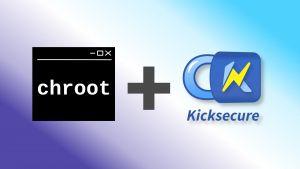Install Kicksecure inside a folder (chroot)

You can install Kicksecure on top of your existing Debian (based) Linux installation inside a chroot.
Introduction
[edit]Understanding the Basics of Creating and Using a Chroot Environment
Creating and using a chroot is like building a small, isolated Linux system within your main system. It's a powerful tool for various purposes, from development to testing. While the concept might seem overwhelming at first, it boils down to a few key commands and a basic understanding of Linux file systems.
In the world of Linux, mastering the creation and use of a chroot (change root) environment is a valuable skill. This process involves two fundamental steps: creating the chroot and then operating within it.
Before we can discuss the chroot (change root), we first need to define what the root directory is. In Linux, the root directory path is symbolized by only a single / (forward slash). See also ls /
. It contains other directories you might already know, such as /etc, /usr, /lib, /var, and so forth.
Creating the Chroot Environment
The chroot environment is essentially a miniature version of a Linux system within your existing system.
To create this environment, you can use tools like debootstrap or mmdebstrap. These tools download a Linux distribution (like Debian or others from different repositories such as Kicksecure) and establish a root file system in a designated folder on your hard drive. For instance, you might create a chroot folder named ~/kicksecure-lxqt-chroot. That folder would then contain the same essential directories, /etc, /usr, and so forth. Here's an example of how that folder structure would look like.
~/kicksecure-lxqt-chroot/etc~/kicksecure-lxqt-chroot/usr~/kicksecure-lxqt-chroot/lib- etc.
This folder structure gets created by the chroot creation tool. There's no need for the user to fully understand the folder structure or process. The process is straightforward, typically requiring just a single command line instruction.
Using the Chroot Environment
Once the chroot folder has been set up, you can start working inside it using commands like chroot or systemd-nspawn.
An example of entering this environment would be: sudo chroot ~/kicksecure-lxqt-chroot zsh. This command changes the root from the main / to ~/kicksecure-lxqt-chroot and starts the Z shell (zsh) in this new context. But don't worry. This does not change the root for your real Linux installation. It only changes the root for the terminal emulator which you are currently using. The rest of your system remains unaffected by this.
You could also use other shells such as bash or applications as needed.
It’s worth noting that more advanced setups might involve emulators like QEMU for a fully emulated operating system, but this would require additional steps like installing a kernel in the chroot.
chroot Creation
[edit]Qubes Notes
[edit]Only users of Qubes need to consider these notes in this chapter.
Users that don't use Qubes or don't know what Qubes is should skip this chapter.
TODO: elaborate
- nosuid / nodev can cause issues?
- default private image size (/home folder) is too small for Kicksecure LXQt
Install Required Tools
[edit]Install package(s) mmdebstrap apt-transport-https apt-transport-tor tor curl following these instructions:
1 Platform specific notice.
- Kicksecure: No special notice.
- Kicksecure-Qubes: In Template.
2 Update the package lists and upgrade the system.
sudo apt update && sudo apt full-upgrade
3 Install the mmdebstrap apt-transport-https apt-transport-tor tor curl package(s).
Using apt command line --no-install-recommends option is in most cases optional.
sudo apt install --no-install-recommends mmdebstrap apt-transport-https apt-transport-tor tor curl
4 Platform specific notice.
- Kicksecure: No special notice.
- Kicksecure-Qubes: Shut down Template and restart App Qubes based on it as per Qubes Template Modification.
5 Done.
The procedure of installing package(s) mmdebstrap apt-transport-https apt-transport-tor tor curl is complete.
Add Signing Key
[edit]It is required to add the signing key on the host because mmdebstrap will need it.
(Users of Kicksecure and Whonix could skip this step since the signing key is there by default.)
The key could be removed at the end. (Except Kicksecure and Whonix should not do this unless they upgrade from source code.)
Complete the following steps to add the Kicksecure Signing Key to the system's APT keyring.
Open a terminal.
1 Package curl needs to be installed.
Install package(s) curl following these instructions:
1 Platform specific notice.
- Kicksecure: No special notice.
- Kicksecure-Qubes: In Template.
2 Update the package lists and upgrade the system.
sudo apt update && sudo apt full-upgrade
3 Install the curl package(s).
Using apt command line --no-install-recommends option is in most cases optional.
sudo apt install --no-install-recommends curl
4 Platform specific notice.
- Kicksecure: No special notice.
- Kicksecure-Qubes: Shut down Template and restart App Qubes based on it as per Qubes Template Modification.
5 Done.
The procedure of installing package(s) curl is complete.
2 Download Kicksecure Signing Key. [2]
Choose your operating system.
If you are using Debian, run.
Choose TLS or onion.TLS (Debian)
TLS.
sudo curl --tlsv1.3 --output /usr/share/keyrings/derivative.asc --url https://www.kicksecure.com/keys/derivative.asc
If you are using a Qubes Debian Template, run.
Choose TLS or onion.TLS (Qubes)
TLS.
sudo http_proxy=http://127.0.0.1:8082 https_proxy=http://127.0.0.1:8082 curl --tlsv1.3 --output /usr/share/keyrings/derivative.asc --url https://www.kicksecure.com/keys/derivative.asc
3 Users can check Kicksecure Signing Key for better security.
4 Done.
The procedure of adding the Kicksecure signing key is now complete.
Set Variables
[edit]File /etc/hostname must exist. [3]
sudo touch /etc/hostname
Set Variables
[edit]Note: You could also replace kicksecure-vm-gui-lxqt with kicksecure-vm-server.
package=kicksecure-vm-gui-lxqt repo=trixie path_to_chroot=~/kicksecure-lxqt-chroot path_to_temp_sources=~/temp-sources.sources
APT Sources List
[edit]Create temporary APT sources list for mmdebstrap.
echo " Types: deb URIs: https://deb.debian.org/debian-security Suites: trixie-security Components: main contrib non-free Enabled: yes Signed-By: /usr/share/keyrings/debian-archive-keyring.gpg Types: deb URIs: https://deb.debian.org/debian Suites: trixie Components: main contrib non-free Enabled: yes Signed-By: /usr/share/keyrings/debian-archive-keyring.gpg Types: deb URIs: https://deb.kicksecure.com Suites: $repo Components: main contrib non-free Enabled: yes Signed-By: /usr/share/keyrings/derivative.asc " > "$path_to_temp_sources"
APT Cache
[edit]Optional. If you are interested, please press Expand on the right side.
This shouldn't be done unless you are behind a firewall since apt-cacher-ng will by default listen on all network interfaces.
Install package(s) apt-cacher-ng following these instructions:
1 Platform specific notice.
- Kicksecure: No special notice.
- Kicksecure-Qubes: In Template.
2 Update the package lists and upgrade the system.
sudo apt update && sudo apt full-upgrade
3 Install the apt-cacher-ng package(s).
Using apt command line --no-install-recommends option is in most cases optional.
sudo apt install --no-install-recommends apt-cacher-ng
4 Platform specific notice.
- Kicksecure: No special notice.
- Kicksecure-Qubes: Shut down Template and restart App Qubes based on it as per Qubes Template Modification.
5 Done.
The procedure of installing package(s) apt-cacher-ng is complete.
Set apt_cacher_ng_maybe variable. [4]
http_proxy=http://127.0.0.1:3142
Create apt-cacher-ng https compatible sources.list file.
echo " deb http://HTTPS///deb.debian.org/debian-security/ trixie-security main contrib non-free deb http://HTTPS///deb.debian.org/debian trixie main contrib non-free deb [signed-by=/usr/share/keyrings/derivative.asc] http://HTTPS///deb.kicksecure.com $repo main contrib non-free " > "$path_to_temp_sources"
Run mmdebstrap
[edit]Run mmdebstrap. [5]
sudo \ $apt_cacher_ng_maybe \ SECURITY_MISC_INSTALL=force \ DERIVATIVE_APT_REPOSITORY_OPTS=stable \ mmdebstrap \ --verbose \ --variant=required \ --include $package \ $repo \ "$path_to_chroot" \ "$path_to_temp_sources"
Chroot Post Processing
[edit]Delete the chroot's temporary /etc/apt/sources.list. [6]
sudo rm "$path_to_chroot/etc/apt/sources.list"
sudo rm "$path_to_chroot/etc/apt/sources.list.d/0000temp-sources.*"
Host Cleanup
[edit]Optional. You can delete the signing key from the host.
If you are interested, please press Expand on the right side.
This is only useful for users not using Kicksecure as their host operating system.
Users of Kicksecure must skip this.
sudo rm /etc/apt/trusted.gpg.d/derivative.gpg
Usage
[edit]Simple Classic Chroot Method
[edit]sudo chroot ~/kicksecure-lxqt-chroot zsh
systemd-nspawn Method
[edit]Install systemd-nspawn
[edit]sudo apt install systemd-container
systemd-nspawn Simple Chroot
[edit]sudo systemd-nspawn -D ~/kicksecure-lxqt-chroot
systemd-nspawn Boot Chroot CLI Only
[edit]sudo systemd-nspawn -D ~/kicksecure-lxqt-chroot /sbin/init
Troubleshooting
[edit]sudo
[edit]sudo su
If seeing this error when using "sudo su".
sudo: effective uid is not 0, is /usr/bin/sudo on a file system with the 'nosuid' option set or an NFS file system without root privileges?
- Qubes users:
- If using mounting home with nosuid.
sudo mount -o remount,suid /rw/home
networking
[edit]systemd-networkd must be enabled on both, the host and inside the VM.
sudo systemctl enable systemd-networkd
sudo systemctl start systemd-networkd
systemd-nspawn Boot Chroot with GUI Support
[edit]This is unfinished. Unspecific to Kicksecure. Could be resolved as per Self Support First Policy.
xhost +local:
sudo systemd-nspawn --setenv=DISPLAY=$DISPLAY -D ~/kicksecure-lxqt-chroot /sbin/init
Exit systemd-nspawn Chroot
[edit]To leave the chroot, press and keep holding key CTRL and press key 5 quickly 3 times within 1 second. [7]
Limitations of systemd-nspawn based Chroot
[edit]Despite these limitations, systemd-nspawn should probably be preferred over classic chroot. Depends on what you are trying to accomplish.
- sdwdate (and Boot Clock Randomization) cannot work inside
systemd-nspawn. - Tor will fail to start inside
systemd-nspawnchrootif Tor is already running on the host in default config (local listen port9050). But that shouldn't matter. Thesystemd-nspawnchrootwill use the host's Tor in this case.systemd-nspawnhas also option to run private networking but these have not been researched for Kicksecure yet.
Footnotes
[edit]- ↑
apt-transport-httpsis required for some older Debian based Linux distributions that have not integrated https support into APT yet. If not available in your distribution, it can be safely ignored.apt-transport-toris required because /etc/apt/sources.list.d/debian.sourcesis using
tor+https. Otherwise we would see the following error.
I: cleaning package lists and apt cache... Reading package lists... E: The method driver /usr/lib/apt/methods/tor+https could not be found. E: The method driver /usr/lib/apt/methods/tor+https could not be found. E: The method driver /usr/lib/apt/methods/tor+https could not be found. E: Failed to fetch tor+https://deb.debian.org/debian-security/dists/buster/updates/InRelease E: Failed to fetch tor+https://deb.debian.org/debian/dists/buster/InRelease E: Failed to fetch tor+https://deb.kicksecure.com/dists/buster-developers/InRelease E: Some index files failed to download. They have been ignored, or old ones used instead. E: apt --option Dir::Etc::SourceList=/dev/null update -oAPT::Status-Fd=<$fd> -oDpkg::Use-Pty=false failed
toris required soapt-transport-torcan use Tor. Otherwise we would see the following error.
I: cleaning package lists and apt cache... Err:1 tor+https://deb.debian.org/debian-security buster/updates InRelease Could not connect to 127.0.0.1:9050 (127.0.0.1). - connect (111: Connection refused) Err:2 tor+https://deb.debian.org/debian buster InRelease Unable to connect to 127.0.0.1:9050: Err:3 tor+https://deb.kicksecure.com buster-developers InRelease Could not connect to 127.0.0.1:9050 (127.0.0.1). - connect (111: Connection refused) Reading package lists... W: Failed to fetch tor+https://deb.debian.org/debian-security/dists/buster/updates/InRelease Could not connect to 127.0.0.1:9050 (127.0.0.1). - connect (111: Connection refused) W: Failed to fetch tor+https://deb.debian.org/debian/dists/buster/InRelease Unable to connect to 127.0.0.1:9050: W: Failed to fetch tor+https://deb.kicksecure.com/dists/buster-developers/InRelease Could not connect to 127.0.0.1:9050 (127.0.0.1). - connect (111: Connection refused) W: Some index files failed to download. They have been ignored, or old ones used instead.
- Actually package
apt-transport-torrecommends packagetorbut listing it here anyhow for those using APT with parameter--no-install-recommends. apt-transport-httpsis suggested below to download the signing key.
- ↑
See Secure Downloads to understand why
curland the parameters--tlsv1.3are used instead ofwget.
Placing an additional signing key into folder/usr/share/keyringsby itself alone has no impact on security as this folder is not automatically used by Debian's APT by default. Only when an APT sources list configuration file points to folder/usr/share/keyringsusing thesigned-bykeyword the signing key will be actually used. Therefore deleting keys in/usr/share/keyringsis optional if intending to disable an APT repository. See also APT Signing Key Folders. - ↑
Fixed in
mmdebstrap0.5.0. Quote changelog
:
do not copy /etc/resolv.conf or /etc/hostname if the host system doesn't have them
Therefore no longer required in Debian
bullseye. - ↑ No longer working. apt_cacher_ng_maybe="--aptopt='Acquire::http { Proxy \"http://127.0.0.1:3142\"; }' --aptopt='Acquire::https { Proxy \"http://127.0.0.1:3142\"; }' --aptopt='Acquire::tor { Proxy \"http://127.0.0.1:3142\"; }'"
- ↑
debootstrapcannot be used since it is a single-mirror Debian chroot creation tool. I.e. it cannot use multiple APT repositories at the same time. And Kicksecure APT repository does not ship any packages available from packages.debian.org. Therefore usingmmdebstrapwhich is a multi-mirror Debian chroot creation.- If you cannot use
mmdebstrapeither (cross platform builds?), you could first create a Debian chroot usingdebootstrap(or anything) and then install a Kicksecure meta package manually inside the chroot.
- If you cannot use
- Whonix: add
anon_shared_inst_tb=open
- ↑
During chroot build process the following files were already created.
/etc/apt/sources.list.d/debian.sources/etc/apt/sources.list.d/derivative.sources
- ↑
https://unix.stackexchange.com/questions/577065/connected-to-container-mycontainer-press-three-times-within-1s-to-exit-sessi


We believe security software like Kicksecure needs to remain Open Source and independent. Would you help sustain and grow the project? Learn more about our 13 year success story and maybe DONATE!











